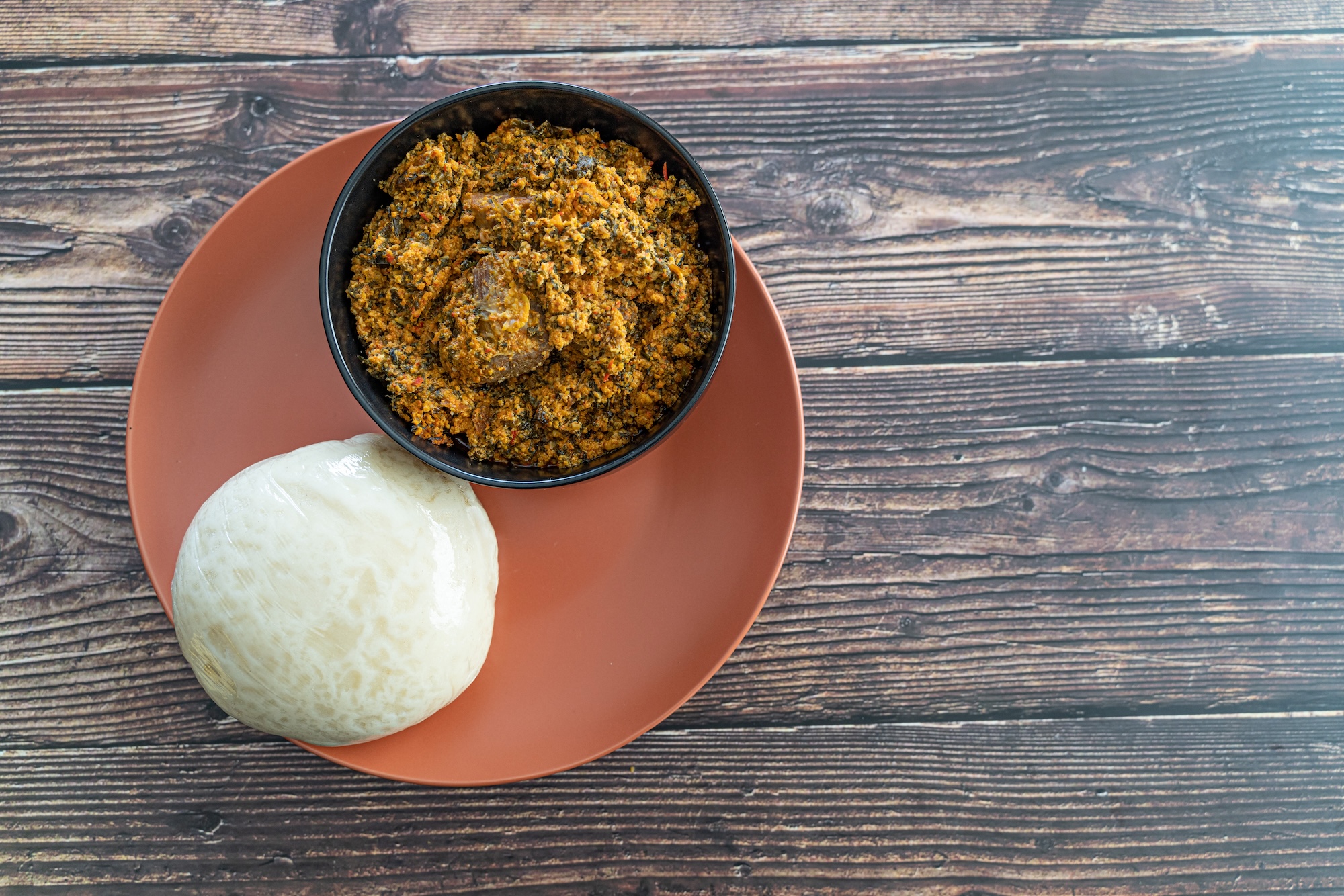When food becomes poison
In Nigeria, the drive to cut corners has turned food and drink into vectors of illness, sacrificing health and heritage at the altar of profit.

Pounded yam with Egusi Soup. Image © Primestock Photography via Shutterstock.
Nigeria possesses one of the richest culinary traditions in the world. From the layered spice of pepper soup to the smoky char of suya, from egusi and efo riro to the ever-controversial jollof, the range and depth of Nigerian food is unmatched. It is a heritage that should have positioned the country as a global food capital, much as Italy, India, or Thailand have built international prestige through cuisine. Instead, Nigeria has become a cautionary tale. The act of eating, the most basic of human functions, has been transformed into a gamble where every meal carries the risk of adulteration, contamination, or outright poisoning.
Across the country, restaurants, roadside vendors, and nightclub owners appear locked in a perverse competition. The prize is not who can deliver the best taste or healthiest fare, but who can maximize profit by cutting the most corners. Palm oil is dyed with industrial chemicals to create the illusion of vibrancy. Fruits are forced to ripen with calcium carbide, a toxic substance that has no place near human consumption. Cooking oils are recycled endlessly, breaking down into harmful compounds long before they reach the plate. The nightlife economy takes this further with counterfeit cognacs, whiskeys, and gins, bottled to mimic global brands and poured confidently at club tables. Consumers believe they are drinking Martell or Jameson; in truth, they ingest cocktails of ethanol, methanol, and coloring agents that can cause liver failure, blindness, or death.
These practices are not occasional. They are systemic. The National Agency for Food and Drug Administration and Control (NAFDAC) periodically announces seizures that reveal the scale of the crisis. In November 2024, officials uncovered a ₦2 billion counterfeit alcohol packaging syndicate in Lagos. Days later, another raid at Balogun Market exposed massive stockpiles of fake spirits. By December, ₦180 million worth of counterfeit liquor was seized in Oke Arin. In May 2025, ₦114 million in fake alcohol was intercepted in Lagos, followed by ₦1 billion worth of expired chemicals and flavorants in July. These figures, staggering as they are, represent only the visible tip of a much larger iceberg. For every seizure publicized, countless bottles, barrels, and crates slip through into restaurants, markets, and clubs.
The culture of adulteration extends beyond Nigeria’s borders, carried by restaurants serving diasporic communities. Too often, a visit to one of these establishments ends with days of diarrhea or stomach cramps. What should have been a source of pride, the global spread of Nigerian cuisine, is instead becoming an export of negligence. Within these communities, the risks have even been normalized into dark humor: “Authentic” Nigerian food, it is said, comes with the guarantee of an upset stomach.
Regulators bear much of the blame. NAFDAC’s periodic raids, while important, are reactive. They treat symptoms rather than causes. The Standards Organization of Nigeria (SON), charged with ensuring that goods meet basic safety requirements, is effectively invisible. These agencies project the image of enforcement but display little capacity for sustained prevention. Their failures allow counterfeit markets like Balogun, Aba, and Oke Arin to operate openly, as if manufacturing adulterated goods was a legitimate sector of the economy.
The consequences are devastating. Public health is being systematically undermined by everyday consumption. The economic costs, from hospitalizations, lost productivity, and premature deaths, are immense but rarely calculated. The reputational damage to Nigerian cuisine is equally severe. The country that has successfully projected Afrobeats as a disciplined, world-class cultural export cannot say the same for its food. The contradiction is glaring: While Burna Boy fills stadiums and Wizkid tops charts, Nigerian restaurants serve dishes laced with expired seasonings and counterfeit oils. One arm of culture soars, the other collapses.
This is more than a health issue. It is a betrayal of heritage. Nigerian food is not simply sustenance. It is identity, history, and memory carried in taste. To adulterate it is to reduce culture to commodity, to transform pride into pathology. The indifference of regulators and the complicity of business owners amount to a collective abdication of responsibility.
It is no longer enough to applaud occasional seizures or to romanticize consumer resilience. Eating in Nigeria should not be an act of courage. Dining in a Nigerian restaurant abroad should not be a gamble with one’s health. What is required is systemic reform: regulators that enforce rules consistently, businesses held to real standards, and consumers who refuse to accept mediocrity as their fate.
Nigeria has everything it needs to lead with its cuisine. It has history, diversity, and a global diaspora eager to share in its food culture. What it lacks is accountability, the assurance that what is called food is not poison and that what is sold as drink will not blind.
Anything less than urgent, sweeping change is not only a public health emergency. It is an insult to the very idea of Nigeria.



